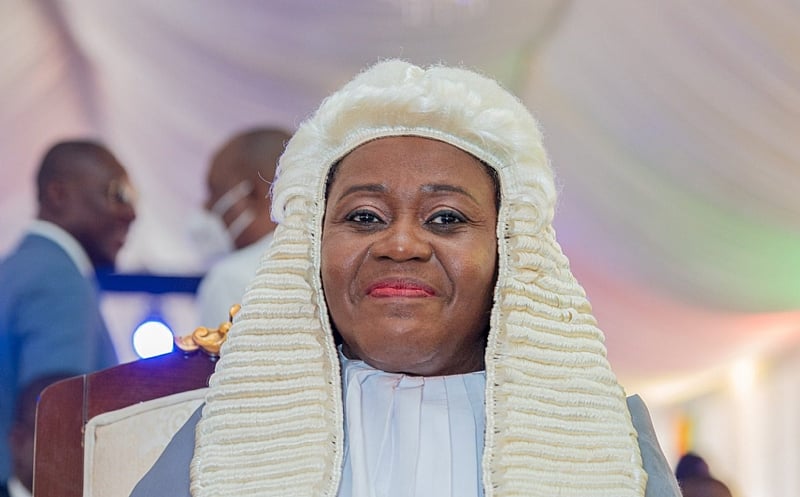Sammy Gyamfi, Acting CEO of GOLDBOD and National Communications Officer of the National Democratic Congress (NDC), has vehemently criticized the Ghana Bar Association (GBA) for its stance on the suspension of Chief Justice Gertrude Sackey Torkornoo. Gyamfi labeled the GBA’s position as “ridiculous and mischievous,” accusing the association of selective silence and political bias. He pointed to the GBA’s perceived inaction during previous incidents involving the New Patriotic Party (NPP), such as the suspension of judges under President Akufo-Addo and alleged attacks on judicial figures by party supporters, contrasting this with their swift condemnation of President Mahama’s actions. This selective engagement, according to Gyamfi, undermines the GBA’s credibility and reveals a partisan agenda. He asserted that the public backlash the GBA has received on social media reflects widespread disapproval of its conduct.
Gyamfi defended President Mahama’s decision, emphasizing that the suspension of the Chief Justice strictly adhered to constitutional procedures. He highlighted Article 146 of the 1992 Constitution, which outlines the process for removing a Chief Justice. According to Gyamfi, President Mahama duly consulted the Council of State, shared the Chief Justice’s responses with them, and proceeded with the suspension only after receiving advice from an overwhelming majority of the Council members (30 out of 31) that a prima facie case existed. This meticulous adherence to the constitutional process, Gyamfi argued, validates the President’s action and refutes the GBA’s claim of unconstitutionality. Furthermore, Gyamfi argued that the seriousness of the allegations against the Chief Justice necessitates her stepping aside to protect the integrity of the ongoing investigation.
The crux of the dispute lies in the interpretation of Article 146 and Article 296(c) of the Constitution. The GBA contends that President Mahama’s suspension of the Chief Justice violated Article 296(c), which addresses the exercise of discretionary power. They demanded the revocation of the suspension, arguing its unconstitutionality. Gyamfi countered this argument, asserting that the President acted within his constitutional mandate under Article 146 and followed due process. He further pointed to the dismissal of specific allegations during the review process as evidence of President Mahama’s fairness and impartiality. This differing interpretation of the relevant constitutional articles forms the basis of the disagreement between Gyamfi and the GBA.
Andrew Egyapa Mercer, a former NPP Member of Parliament, also questioned the basis and process of the suspension. He expressed doubt about the establishment of a prima facie case and emphasized the importance of adhering to the letter and spirit of the Constitution. While acknowledging that the Chief Justice is not above the law, Mercer argued that the legal processes must be scrupulously followed. He pointed to the lack of published regulations guiding the President’s discretionary powers under Article 296 as a weakness in the process. Mercer endorsed the GBA’s call for the suspension to be revoked and defended the Chief Justice’s role in recommending judicial appointments, arguing that her position as head of the judiciary naturally entails such responsibilities. He urged public participation in a protest to defend the integrity of the judiciary.
Dr. Theo Acheampong, a political risk analyst and economist, offered a nuanced perspective on the situation. While acknowledging the GBA’s right to express its position, he questioned its moral authority and the timing of its resolution, suggesting a political undertone. He further criticized the legal basis of the GBA’s argument, urging them to seek judicial interpretation if they genuinely believed the President had acted unconstitutionally. Acheampong’s commentary adds another layer to the debate, highlighting the perceived politicization of the issue and the need for clear legal clarification.
In essence, the suspension of Chief Justice Torkornoo has ignited a complex legal and political debate. The core issue revolves around the interpretation of constitutional provisions and the perceived fairness of the process. Gyamfi and President Mahama maintain that the suspension was constitutionally sound and procedurally proper. The GBA, supported by Mercer, argues that the suspension was unconstitutional and driven by ulterior motives. Acheampong, while not explicitly siding with either party, questions the GBA’s approach and calls for a more objective legal analysis. The ongoing public discourse and potential legal challenges will ultimately determine the outcome of this contentious issue and its implications for the Ghanaian judiciary.














